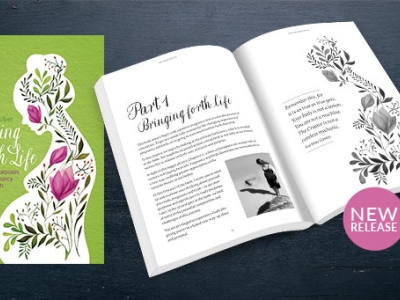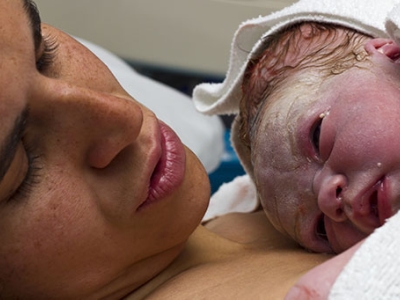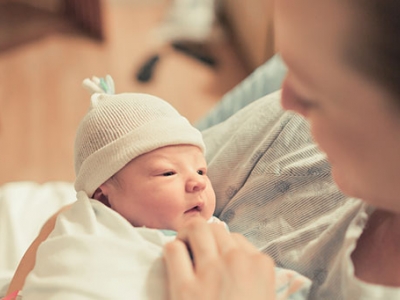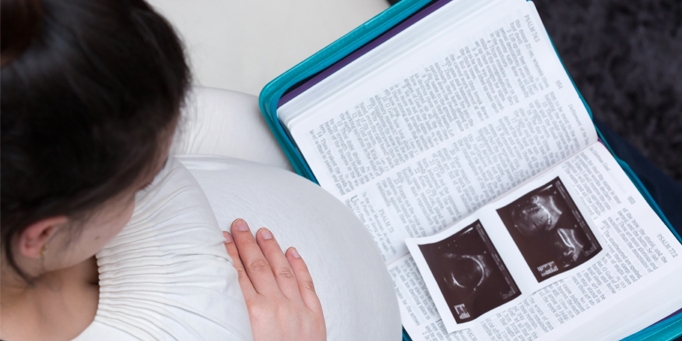
Our birth stories in the light of God’s
An excerpt from ‘Bringing Forth Life: God’s Purposes in Pregnancy and Birth’.
Jodie McIver’s book Bringing Forth Life: God’s Purposes in Pregnancy and Birth made the shortlist for the 2023 Australian Christian Book of the Year Award! Watch Jodie’s interview at the awards night (starting from 10:00).
Pregnancy
While prior to pregnancy, we may have a rosy picture in our minds of growing and glowing, supporting new life in our bodies brings sudden changes. I expected to breeze through pregnancy without ‘morning sickness’, as I’d only ever vomited a handful of times in my life. However, my pregnancy journal entries depict a sudden change of tone upon its unwelcome arrival. My initial shock and excitement give way to a wallowing in nausea, vomiting and fatigue only days later. While I am thankful to have had pretty ‘easy’ pregnancies overall, they still entailed great changes to my comfort and productivity. For some women, carrying a baby is much harder.
This is also true of the Bible’s birth story. God carries his children at great cost to himself.
Our own aches and pains in pregnancy are a dim reflection of the great pain through which God bears with his people. Despite the horrendous nature of much of the human story in the Old Testament, God continues faithfully bringing his people towards new birth.
Part of the way he does this is through human pregnancy (in all its complexity). Pregnancy isn’t kept behind closed doors or relegated to the realm of ‘women’s business’ in the Bible. In the grief of infertility for many women, God provides miraculous pregnancy and birth, bringing new life and a fresh start for his people. There are also many specific pointers towards an even more significant birth that God has planned (2 Samuel 7:12; Isaiah 7:14; Micah 5:2–3).
The Old Testament is, like pregnancy, a story of awaiting the promise of what’s to come, for hopes to be fulfilled and the moment of new birth to arrive.
It is interesting to compare the 40 weeks of pregnancy with the similarly timed transition events of the Old Testament. Noah’s family and the animals endured 40 days of flood; Moses spent 40 days on Mount Sinai communing with God; the people of Israel spent 40 years in the wilderness, awaiting entry to the Promised Land. All these stories of waiting are pregnant with the anticipation of new life. Although fulfilled in one sense at the end of those 40 days or years, they also form part of God’s overarching birth story, as we wait for the big moment to arrive. Isaiah the prophet foretells that ‘the earth will give birth to her dead’ (Isaiah 26:19b).
Birth
A big part of the birth stories we usually hear is the experience of labour leading up to birth. Some women describe days of exhausting but irregular contractions, while labour is intense from the beginning for others. Labour is hard work by both name and nature, but it is much more than just hardship. Labour is a dynamic process that is working towards birth. We will come to understand this more thoroughly in Chapter 4.
The New Testament tells of Jesus’ labour to give us new birth through his birth, death and resurrection. In the inglorious circumstances of a Bethlehem stable, Mary gives birth to Jesus with blood, sweat and probably tears. The humble circumstances of this story are part of what makes it so significant. This was Mary’s labour for new life, but in the bigger picture it was also God being willing to take on the completely passive role of a human baby to bring us new life.
None of us choose to be born—were we given that choice, we might have felt more than a little squeamish about the prospect! Yet God, the author of life, came to us through human birth. This was itself a labour of love.
This experience of gasping, crying and lacking bodily control as a newborn was merely the early beginnings of Jesus’ labour for us. Jesus would endure physical, emotional and spiritual labour in the lead-up to and on the cross. He would willingly continue beyond even the kind of anguish that our final stages of labour may evoke in us in order to give us new birth (Matthew 26:37–39; 27:46). God has always been willing to bear the cost of bringing forth life.
Through this labour, Jesus gives new spiritual birth as children of God to all who believe in him (John 1:12–13). As conception and pregnancy reach their fulfillment in birth, so all God’s life-giving work from the beginning is fulfilled in Jesus’ resurrection and our new birth that flows from it. This is the pinnacle of the Bible’s story and at the very heart of what it is to be a child of God.
This spiritual birth brings a whole new kind of life, bigger and deeper than we can fully deal with in this book, or even grasp. For our unborn babies dwelling in a cosy darkness—its limits already reached by their limbs—birth into life in this present wide world must be completely unimaginable. How much more this new eternal life that we are born into (John 3:6–8)!
Through Jesus’ resurrection, we have been born as God’s children.
Newborn life
During pregnancy, it is easy to be preoccupied with its end point. Yet when this moment arrives, we become aware that it is much more of a beginning than an ending.
My work was far from over after my son’s birth. Newborn babies grow and develop very rapidly, doubling or even tripling their birthweight in a matter of months. My baby’s voracious appetite quickly transformed his petite infant form into that of a roly-poly ball of mischief. Birth is the beginning of a new life, in more ways than one.
In our new life as God’s children, there is much development ahead for us (1 John 3:2). In Peter’s first letter, he urges us ‘Like newborn babies, crave pure spiritual milk, so that by it you may grow up in your salvation, now that you have tasted that the Lord is good’ (1 Peter 2:2–3). In God’s care, nourished by his Spirit and his word, we are growing into who we will become.
This is also our reality as new mothers. You might feel like an imposter when you first hold your newborn baby—or even that you don’t know exactly how to hold them! Though you have already become a mother, you are still brand new to this role. You are starting from the beginning together with your baby. We will delve deeply into this experience in Part 3.
This is the story of our life now, as children of God and simultaneously as ‘newborn’ mothers, learning and growing into both these roles. God will be changing us powerfully through our experience of pregnancy, birth and new motherhood.
Our birth stories in light of God’s
The Bible is a story of God bringing forth life through birth. It tells stories of human birth, including that of Jesus himself, but places a whole new kind of birth at its very core. Birth, in all its complexity, is central to God’s plans and character.
The Bible therefore broadens our horizons from having a baby just because it’s a bit exciting or ‘the done thing’ to instead see God’s purposes in these experiences. Sharing with God in his work of bringing forth life offers us a new opportunity to participate in something much bigger. Our own birth stories point towards this ultimate birth story.
This is an extract from Jodie McIver’s shortlisted book, Bringing Forth Life: God’s Purposes in Pregnancy and Birth. Watch Jodie’s interview at the 2023 Australian Christian Book of the Year Awards night (starting from 10:00).
** Jodie McIver is available to speak and run workshops at your church. Contact our team to register your interest: team@growingfaith.com.au.**
---
Jodie McIver is a registered midwife and a graduate of Moore Theological College. Jodie is married to Tim; they are in ministry at Blackheath Anglican Church and are the parents of three lively children. Jodie’s book Bringing Forth Life: God’s Purposes in Pregnancy and Birth brings together her love of theology, relationships and the human body.
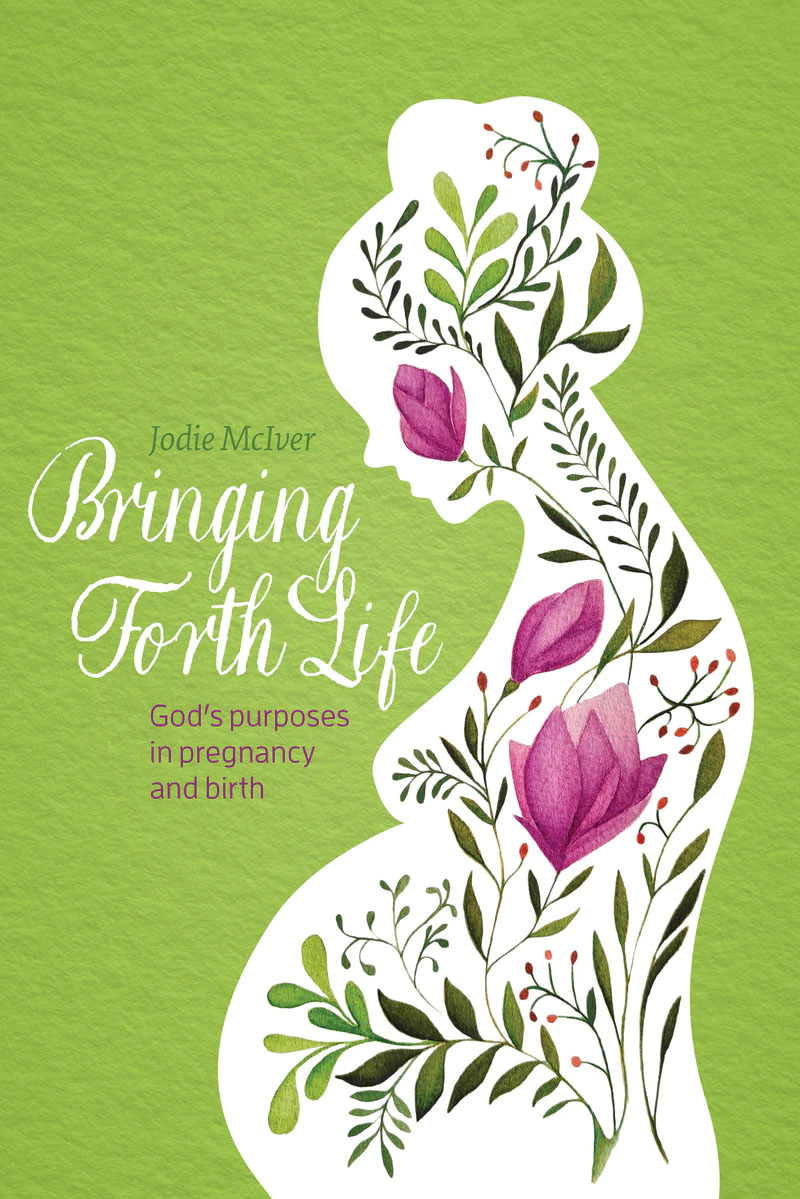
Bringing Forth Life
Pregnancy and birth bring a whirlwind of change to a woman’s body, identity, life and relationships. This is a huge transition, filled with excitement, uncertainty and anxiety. What exactly is going on in our bodies? How do we make decisions about pregnancy care and birth? What will life be like as parents? What if something goes wrong?
For more articles from Growing Faith, subscribe to our monthly e-newsletter.
To hear about the latest books and resources from Youthworks Media, subscribe here.


